How did the First Chechen War begin
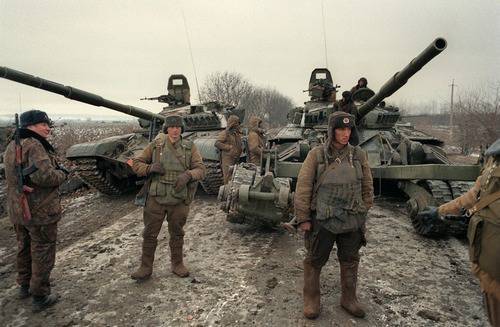
The events leading up to the First Chechen must be divided into two stages. The first is the period from 90 to 91, when there was still a real opportunity to overthrow the Dudayev regime without bloodshed and the second stage from the beginning of 92, when the time to normalize the situation in the republic was already missed, and the issue of military solution of the problem became only a matter of time.
Stage one. How it all began.
The first impetus to the beginning of events can be considered Gorbachev's promise to give all autonomous republics the status of allies and the subsequent phrase by Yeltsin - “Take as much independence as you can carry.” Desperately struggling for power in the country, they wanted in this way to get support from the residents of these republics and probably did not even imagine what their words would lead to.
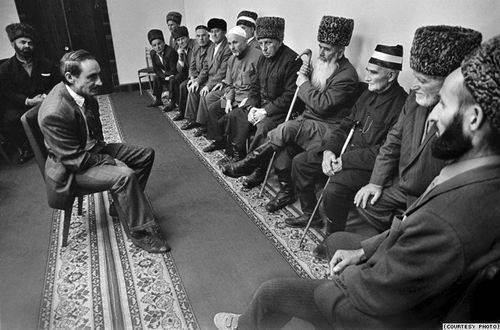
Within a few months after Yeltsin's statement, in November 1990, the Supreme Council of the Chechen-Ingush ASSR, headed by Doku Zavgayev, adopted a declaration on the state sovereignty of Checheno-Ingushetia. Let in fact it was only a formal document adopted with an eye to obtaining greater autonomy and authority, but still the first bell was already given. At the same time, little-known figure of Dzhokhar Dudayev appears in Chechnya. The only Chechen general in the Soviet Army who was never a Muslim and who had government awards for military operations in Afghanistan quickly began to gain popularity. Perhaps even too fast. In the same Chechnya, many are still confident that serious people were sitting behind Moscow’s Dudaev’s offices.
Perhaps these same people helped Dudayev to overthrow the Supreme Soviet with its chairman, Doku Zavgayev, 6, September, 1991. After the dissolution of the Supreme Council, power as such in Chechnya no longer existed. The warehouse of the KGB of the republic, in which the rifle weapons all the criminals who were there were released from the prisons and the SIZO. However, all this did not prevent 26 from October of the same year from holding a presidential election on which, as expected, Dudayev himself won, and on November 1 to adopt a declaration on the sovereignty of Chechnya. It was no longer a bell, but a real ringing of the bell, but in the country it seemed that they did not notice what was happening.
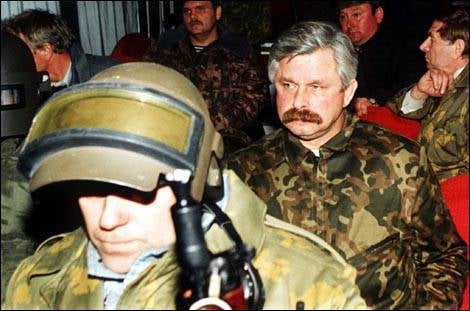
The only person who tried to do something was Rutskoi, it was he who tried to declare the State of Emergency in the republic, but no one supported him. These days, Yeltsin was in his country residence and did not pay any attention to Chechnya, and the USSR Supreme Soviet did not accept the document on the state of emergency. In many ways, this happened because of the aggressive behavior of Rutsky himself who declared the following document when discussing the document - “these black-eyed people must be crushed.” This phrase almost ended his scuffle in the Council building, and of course there could be no question of accepting a state of emergency.
True, despite the fact that the document was never adopted, in Khankala (a suburb of Grozny) several sides landed with fighters of the internal troops, totaling about 300 people. Naturally, 300 people had no chance to complete the task and overthrow Dudayev and, on the contrary, themselves became hostages. For more than a day, the fighters were actually surrounded and, as a result, the buses were taken outside of Chechnya. A couple of days later, Dudayev was inaugurated to the presidency and his authority and authority in the republic became unlimited.
Stage Two. War becomes inevitable.
After Dudaev officially took office as president of Chechnya, the situation in the republic grew tense every day. Every second resident of Grozny walked freely with weapons in his hands, and Dudaev openly declared that all the weapons and equipment that are on the territory of Chechnya belong to him. And there were a lot of weapons in Chechnya. In only the 173rd Grozny training center there were weapons in 4-5 motorized rifle divisions including: 32 tank, 32 infantry fighting vehicles, 14 armored personnel carriers, 158 anti-tank installations.
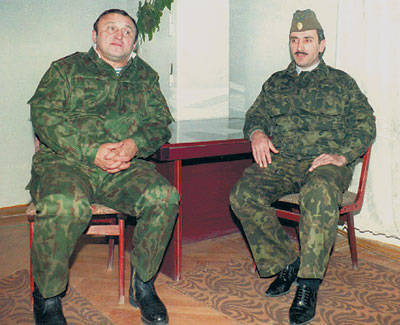
In January, 92, in the training center, there was practically no soldier left, and all this mass of weapons was guarded, only officers who remained in the military camp. Despite this, the federal center did not pay any attention to it, preferring to continue to share power in the country, and only in May 93, did Defense Minister Grachev arrive in Grozny for talks with Dudayev. As a result of the negotiations, it was decided to divide all 50 weapons available in Chechnya to 50, and in June the last Russian officer left the republic. Why it was necessary to sign this document and leave such a mass of weapons in Chechnya to this day remains incomprehensible, because in 93, it was already obvious that the problem could not be solved by peaceful means.
At the same time, due to the extremely nationalistic policy pursued by Dudayev, a mass exodus of the Russian population from the republic is taking place in Chechnya. According to the then Minister of the Interior, Kulikov every day crossed the border to 9 Russian families per hour.
But the anarchy that took place in the republic influenced not only the Russian inhabitants in the republic itself, but also the inhabitants of the other regions. So, Chechnya was the main producer and supplier of heroin to Russia, also, about 6 billion dollars were withdrawn through the Central Bank as a result of the famous story with fake Avisos and, most importantly, they earned it not only in Chechnya, they received financial benefits from it. Moscow Otherwise, how can one explain that in the 92-93 years, famous Russian politicians and businessmen came to Grozny almost every month. According to the memoirs of the former mayor of Grozny, Bislan Gantamirov, before each such visit of the “distinguished guests” Dudayev personally gave instructions on purchasing expensive jewelry, explaining that this is how we solve our problems with Moscow.
It was no longer possible to close our eyes to this, and Yeltsin instructed the head of the Moscow Federal Counterintelligence Service (FGC) Savostyanov to carry out an operation to overthrow Dudayev with the forces of the Chechen opposition. Savostyanov staked on the head of the Nadterechny district of Chechnya, Umar Avturkhanov, and began to send money and weapons to the republic. 15 October 1994 began the first assault on Grozny by opposition forces, but when less than 400 meters were left before Dudayev Palace, someone from Moscow contacted Avturkhanov and ordered him to leave the city. According to the information of the former chairman of the USSR Supreme Soviet Ruslan Khasbulatov, this “someone” was none other than the organizer of the assault on Savostyanov.
The next assault attempt by the opposition forces was carried out on 26 on November 1994 of the year, but it also failed miserably. It was after this assault that Defense Minister Grachev would in every way repudiate Russian tankers who had been captured and declare that the Russian Army would have taken Grozny within an hour by the forces of one airborne regiment.
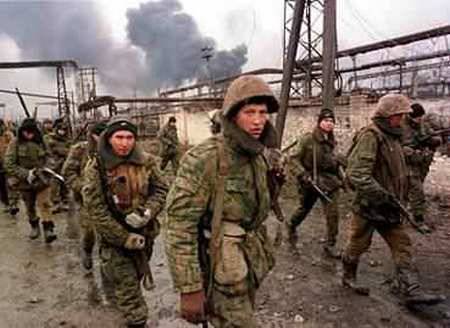
Apparently, even in the Kremlin itself, they did not particularly believe in the success of this operation, because a couple of weeks before the assault in Moscow, a secret meeting of the Security Council had already taken place, entirely devoted to the Chechen problem. At this meeting, the Minister of Regional Development Nikolay Egorov and the Minister of Defense Pavel Grachev delivered two polar reports. Egorov said that the situation for bringing troops into Chechnya is extremely favorable and 70 percent of the republic’s population will undoubtedly support this decision and only 30 will be neutral or will resist. Grachev, on the contrary, in his report stressed that the introduction of troops would not lead to anything good, and we would meet with fierce resistance and suggested that we move the input to spring, so that there was time to prepare the troops and draw up a detailed plan of the operation. Prime Minister Chernomyrdin in response to this openly called Grachev a coward and said that such statements were not acceptable for the Minister of Defense. Yeltsin announced a break and, together with Rybkin, Shumeiko, Lobov and several other unknown members of the government, held a closed meeting. It resulted in Yeltsin’s demand to prepare a plan for the deployment of troops within two weeks. Grachev could not refuse the president.
On November 29, the second meeting of the Security Council was held in the Kremlin, at which Grachev presented his plan, and the decision to deploy troops was finally made. Why the decision was made in such a hurry is not known for certain. According to one of the versions, Yeltsin personally wanted to solve the problem of Chechnya before the new year and thus raise his extremely low rating. According to another, a member of the international committee of the State Duma, Andrei Kozyrev, had information that if the Russian Federation resolved the problem of Chechnya in the near future and in a short time, this would not cause a particular negative reaction from the US administration.
One way or another, the entry of troops took place in extreme haste, which led to the fact that at once five generals, whom Grachev offered to lead the operation, refused to do so, and only in the middle of December Anatoly Kvashnin agreed to this. Before the New Year's assault on Grozny there were less than two weeks left ...
Information